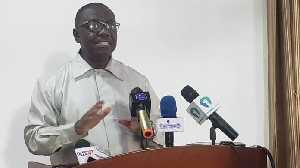 Ashanti Regional Director of Health, Dr. Emmanuel Tenkorang
Ashanti Regional Director of Health, Dr. Emmanuel Tenkorang
The Ashanti Regional Directorate of the Ghana Health Service (GHS) is expressing concern over the exponential increase in malaria cases in the Ashanti Region. This comes as the directorate begins registration for a mass distribution of long-lasting insecticide-treated nets in the region.
In 2023 alone, the number of malaria cases recorded in Outpatient Departments in the region reached the 900,000 mark, representing an increase of one hundred thousand cases over the 2022 figure of 800,000 recorded cases.
Addressing the media ahead of the registration exercise, the Ashanti Regional Director of Health, Dr. Emmanuel Tenkorang, pointed out that, aside from the pressure on health facilities, the situation poses a significant financial and economic burden for the country. "It constitutes one of the most socio-economic burdens in this region, in the country, and in Africa. If you look at the figures in the Ashanti Region, you realize that it constitutes one of the major burdens in our OPD attendance," he said.
He disclosed, "If you look at our insurance payments, you will realize that one of the major burdens is malaria. So any strategy to reduce malaria will save us a lot of money in this country. That is the reason why the nation has adopted the National Malaria Elimination Program to reduce both morbidity and mortality associated with malaria, especially in children under five and in pregnant women," he emphasized.
The Health Director noted that the registration, which begins on June 7th and ends on June 11th, will register households in 41 districts of the Ashanti Region, excluding Obuasi and Obuasi East, where a special indoor residual spraying exercise against malaria is underway.
Dr. Tenkorang indicated that the service expects the public to cooperate and refrain from using the nets for purposes other than protecting themselves from mosquito bites. "It is unfortunate that sometimes we see the mosquito nets being used for other unapproved purposes, including as fences for gardens and as covers to cart refuse," he said.
He warned, "This program is being sponsored by partners, and it becomes an indictment on the country. They will think we are not very serious about what we are doing."
Dr. Tinkorang, however, proposed the need for legislation or policy direction that could be enforceable to hold accountable those who use the nets inappropriately.
The point mass distribution exercise, which forms part of Ghana’s National Malaria Elimination Program, aims to reduce the transmission of malaria by ensuring that a large portion of the population is protected from mosquito bites. It also seeks to reduce the morbidity and mortality associated with malaria, as well as the high cost burden of treating malaria in Ghana.
The health service further aims to make an impact on productivity and socio-economic development as it works towards achieving its malaria elimination targets among the population.